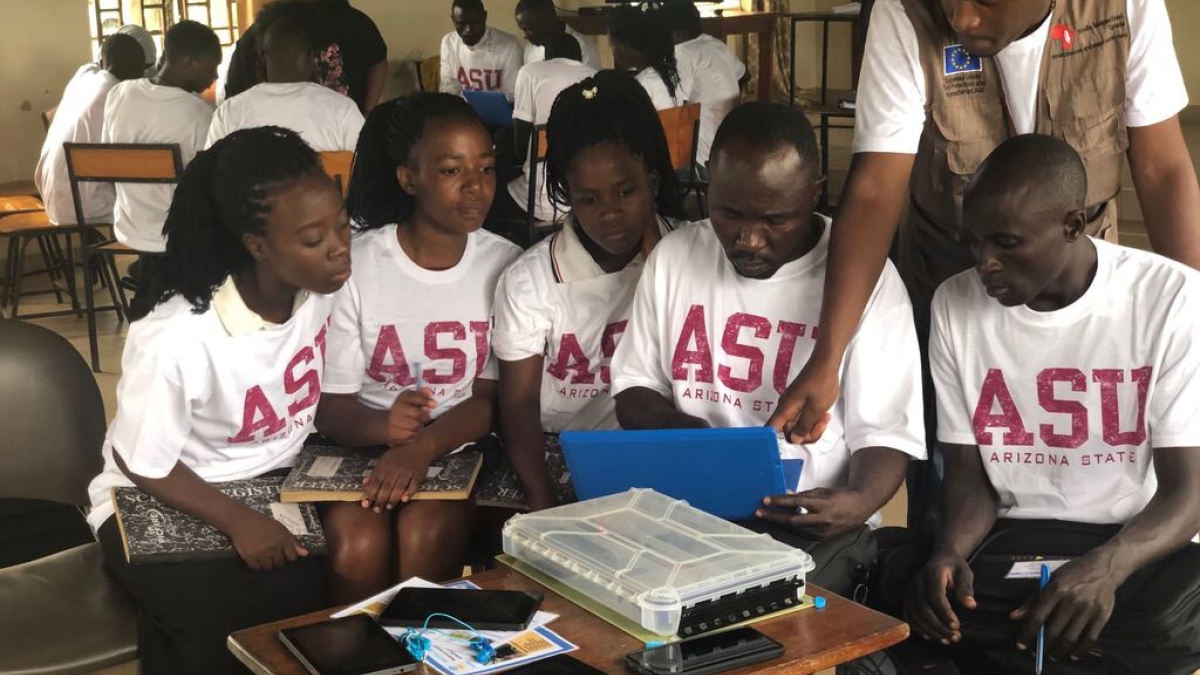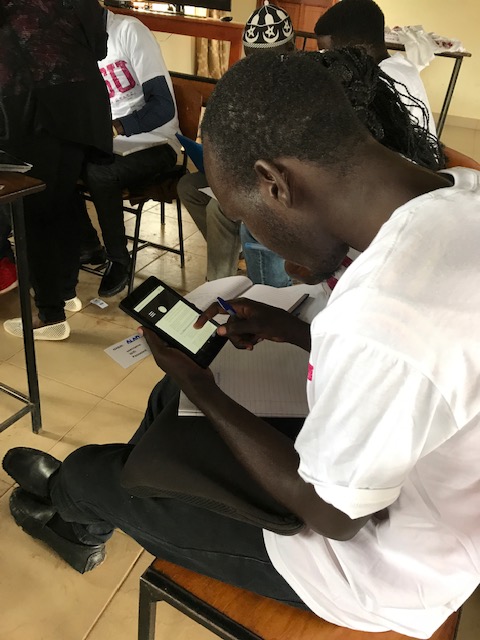When students in Uganda learn about the principles of agribusiness marketing, they really understand them, because many of them are already selling vegetables as their livelihood.
A group of 30 people who live in a refugee settlement in Uganda are the first to take the online Agribusiness 250 course through Education for Humanity, an initiative of Arizona State University that is offering higher education to refugees in Lebanon, Jordan, Iraq, Uganda and Rwanda. Education for Humanity is managed by EdPlus, the unit at ASU that creates technology and forges partnerships to develop new ways of teaching and learning.
More than 68 million people are displaced around the globe, according to the United Nations Refugee Agency, and fewer than 1% have access to higher education. Education for Humanity is trying to address that need.
Jeff Englin, a professor in the Morrison School of Agribusiness in the W. P. Carey School of Business, has been teaching Agribusiness 250, Resource Allocation: Food and Agriculture, for several years to students at ASU, where it’s popular not only with agribusiness students but also those majoring in nutrition and sustainability, he said. It’s an introductory class that covers economic principles that are important in agriculture.
The course content is self-contained on devices, which are used by the students in Uganda. Every few days, their course facilitator sends their work back to the professor at ASU. Photo contributed by Education for Humanity
About two years ago, Englin was asked to modify the course for Education for Humanity.
“It was an opportunity to pitch in and help these folks get some education to get a more productive life and it seemed like a great thing to do,” he said.
There were two main challenges: the delivery method and the content.
In many refugee communities, internet access is very limited. In Uganda, Education for Humanity is providing the course through SolarSPELL, a solar-powered, offline digital library that was invented by Laura Hosman, an associate professor in the School for the Future of Innovation in Society at ASU. The Education for Humanity team and others at EdPlus created technological changes on the SolarSPELL to make it possible for students to access both the digital library and the course. Students access the coursework, which includes text, PowerPoints, quizzes and interactives, on devices provided by Education for Humanity. Every few days, the course facilitators download the students’ work and send it back to Englin on phones provided by Education for Humanity.
At ASU, Englin used a textbook by a major publisher for the course. But in Uganda, because the content is self-contained on the SolarSPELL devices, the publisher was unwilling to allow its materials to be used.
“They said it’s proprietary information and they couldn’t control its use,” he said.
So Englin and his team redid the entire class using open-source materials, which are free on the internet.
“Then the challenge was to replicate all of the economics in a way that would be relevant to them,” he said. “So using an analogy of a business like Circle K doesn’t mean much to them.”
While specific examples were among the content that was modified to make sense for the learners in Africa, they immediately grasped the economic principles, Englin said.
“Take a concept like monopolistic competition — where you try to make yourself a little different in the marketplace,” he said. “They go to the market every Friday. Everyone sells carrots. Why should someone buy your carrots? Because you displayed them differently or did something different.
“They latched onto that concept instantaneously. They’re all entrepreneurs and marketing ideas really resonate with them.”
The 30 students in the Nakivale refugee settlement in Uganda include 10 women and 20 men of several nationalities: Burundian, Congolese, Rwandan, South Sudanese, Sudanese, Somali and Ugandan.
Education for Humanity started offering courses, including English-language classes, to refugees two years ago, working closely with partners in the host countries, such as humanitarian agencies and ministries of education. For this program, ASU is working closely with Windle International Uganda with the support of the U.N. Refugee Agency and Ugandan Office of the Prime Minister. The courses are free for the refugees thanks to support from a private donor and matching funds from ASU.
The agribusiness class started April 29 and has about a month more to go, but Englin said that at least two-thirds of the students have already taken their final exam and finished.
“They’re motivated and serious students,” said Englin, who added that the students enjoyed using the devices. “They’re enthusiastic about having an analytical framework to put their experiences into.
“The average performance is at least as good as the average ASU performance, and the top quarter matches against anybody who’s ever taken my class.”
Top image: Students in a refugee community in Uganda started taking an online agribusiness course in April through Education for Humanity. Photo contributed by Education for Humanity.
More Arts, humanities and education

ASU instructor’s debut novel becomes a bestseller on Amazon
Desiree Prieto Groft’s newly released novel "Girl, Unemployed" focuses on women and work — a subject close to Groft’s heart.“I have always been obsessed with women and jobs,” said Groft, a writing…

‘It all started at ASU’: Football player, theater alum makes the big screen
For filmmaker Ben Fritz, everything is about connection, relationships and overcoming expectations. “It’s about seeing people beyond how they see themselves,” he said. “When you create a space…

Lost languages mean lost cultures
By Alyssa Arns and Kristen LaRue-SandlerWhat if your language disappeared?Over the span of human existence, civilizations have come and gone. For many, the absence of written records means we know…



